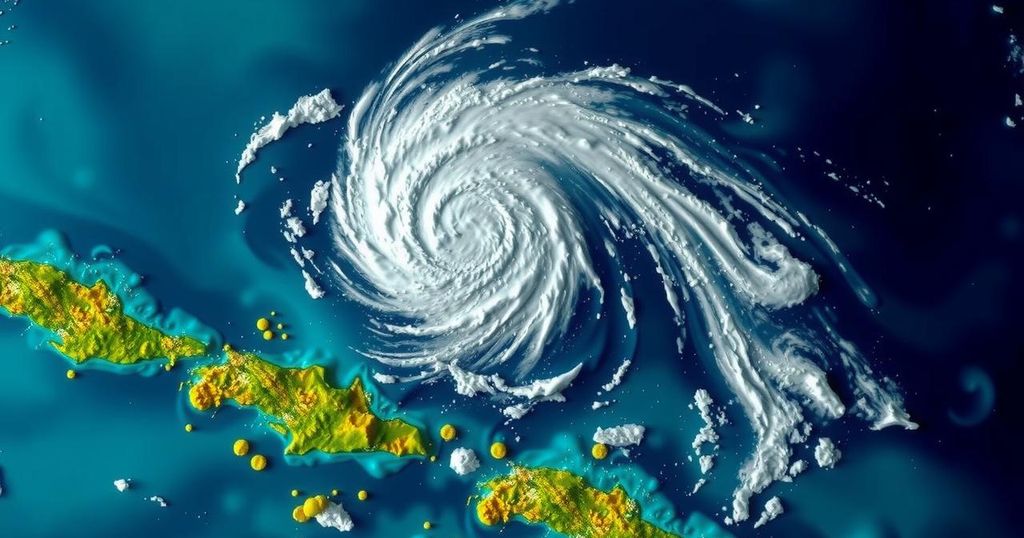Tropical Storm Oscar Weakens After Deadly Impact in Cuba

Tropical Storm Oscar has weakened into remnants after causing significant damage in Cuba, including seven fatalities and heavy rainfall. The storm is noted for being the smallest recorded hurricane and surprised meteorologists with its rapid intensification. Its remnants are forecasted to bring additional rain to the southeastern Bahamas and Turks and Caicos, while Hurricane Kristy is strengthening in the eastern Pacific without posing a land threat.
Tropical Storm Oscar has disintegrated while moving toward the Bahamas, having previously made landfall as a Category 1 hurricane in Cuba, where it tragically caused the deaths of at least seven individuals. Following its impact, Oscar’s remnants were detected approximately 75 miles east-southeast of Long Island in the Bahamas, with maximum sustained winds reduced to 35 mph as it progressed northeast at 12 mph, as reported by the National Hurricane Center in Miami. The remnants are anticipated to unleash up to four inches of rainfall across the southeastern Bahamas and the Turks and Caicos Islands. Remarkably, Oscar is recorded as the smallest hurricane ever documented, characterized by a wind field of merely six miles in diameter. Its rapid intensification took meteorologists by surprise during its landfall on Grand Inagua Island in the Bahamas, followed by a secondary landfall on eastern Cuba late Sunday. Michael Lowry, a hurricane specialist, reiterated the unusual circumstances surrounding the storm, noting, “It is not often we see a colossal failure in hurricane forecasting,” highlighting that no predictive models had suggested a strengthening of Oscar into a hurricane. In Cuba, the storm precipitated over 15 inches of rain in eastern regions, prompting warnings of severe flooding and potential landslides, with the fatalities reported in the province of Guantánamo. The situation was exacerbated as Cuba grapples with a significant power outage, leading to minor protests and government admonitions against civil unrest. Oscar represented the 15th named storm and the 10th hurricane of the Atlantic hurricane season, which runs from June 1 to November 30. Forecasters predict another storm may form in the central Caribbean shortly. Moreover, alongside Oscar’s dissipation, Hurricane Kristy has strengthened in the eastern Pacific, maintaining a trajectory away from land while intensifying with maximum sustained winds of 75 mph.
The Atlantic hurricane season occurs annually from June 1 until November 30, during which meteorologists monitor the development, intensity, and paths of tropical storms and hurricanes. The recent Atlantic hurricane season has been marked by unusually warm ocean temperatures, prompting predictions of an above-average storm season. Tropical Storm Oscar, emerging as an unprecedented small hurricane, challenged existing forecasting methodologies and highlighted the unpredictable nature of tropical cyclones. This season has already recorded significant storm activity, which includes Oscar as both a named storm and a hurricane, and there are further expectations for additional storms in the near future.
In summary, Tropical Storm Oscar has caused significant devastation in Cuba, leading to casualties and substantial rainfall that poses further risks of flooding. The storm’s unexpected intensification as a hurricane caught meteorologists off guard, emphasizing the challenges faced in forecasting such weather events. As the Atlantic hurricane season progresses, ongoing monitoring is crucial, especially with predictions of potentially new storm developments in the coming weeks.
Original Source: gvwire.com








